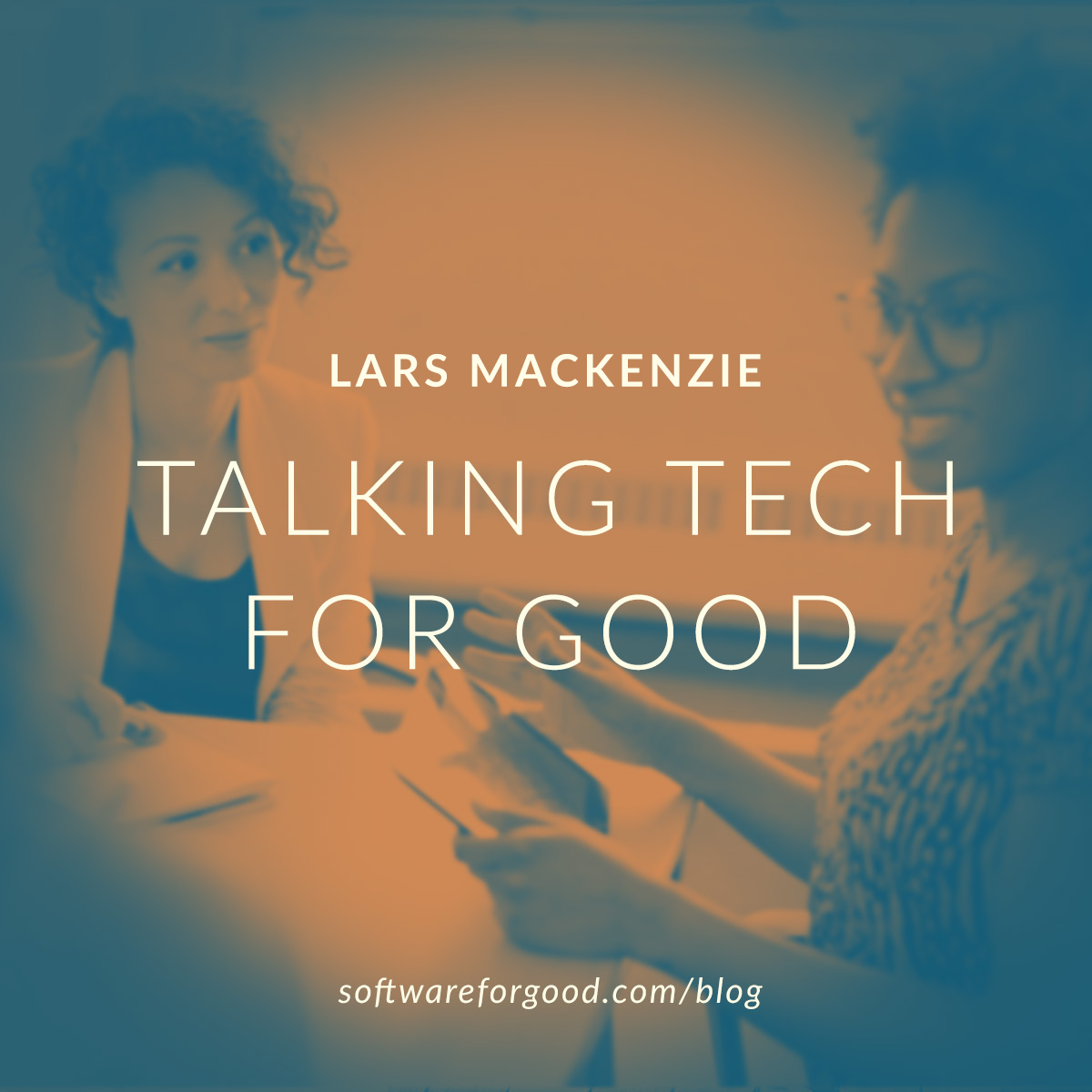At Software for Good, we help people across sectors use technology to simplify complex processes, communicate important information, and help people be more effective in their work for social and environmental impact.
In Talking Tech for Good, we talk to people who use technology for positive change every day.
Lars Mackenzie
Digital Technology Specialist at the University of Minnesota & Freelance Web Developer

Where do you work, and what is your job?
I currently work at the University of Minnesota supporting the website for a community-oriented faculty research project. My other major job up until recently has been working on finishing my PhD, which I just did in February. My research examined the impacts of data-driven decision-making and software design on trans and gender non-conforming people. I also do freelance web development work.
How do you use and/or build technology in your work?
I think about and use technology a lot in all of the work that I do. In my freelance work, I build websites and applications for clients. In my role at the U, I’m focused on maintaining a website that showcases digital storytelling projects created by Twin Cities middle school students. I get to work with other educational technologists to strategize how to manage digital media assets, create and categorize metadata, and prioritize student privacy while showing off their awesome work.
As a researcher, I use lots of tools for data analysis and data collection, especially for one piece of my project where I scraped and analyzed social media posts.
How does your work pursue or support social good?
I love getting to work on the middle school digital storytelling project’s website for this exact reason. This program teaches young people how to create digital stories about their experiences and pushes them to think about social justice, race, gender, class, disability, citizenship, and other really important issues. It gives them an outlet to process their experiences, share their voices, and build technical skills in putting together multimedia projects. I’ve worked on this project in a variety of roles over the past five years and it’s been a great experience.
In my academic work, I’ve conducted research that investigates the impacts of big data and consumer data economies on marginalized people. I was really interested in examining the effects of all of this data collection on trans and gender non-conforming people whose identities change over time. Because data is perceived as highly valuable, especially for instance, in a person’s credit report, outdated information sticks to a person. I found that in healthcare and the financial sectors in particular, when trans people have outdated or mismatching identity data, they experience significant barriers to obtaining loans, jobs, housing, and healthcare coverage, including discrimination, delays, and denials. The effects of mismatching or inaccurate information are compounded on trans people of color, immigrants, and disabled people. All of the information that’s generated about an individual circulates through third-party data brokers, mailing lists, etc. and it’s very hard to track down the original source to correct it. This is a software design problem in one sense, but it’s also about cultural attitudes — both about transphobia and about the belief in the inherent value of data — that need to be changed.
Moving forward, I intend to apply my research insights to the industry, helping to reshape how technologists, policy makers, and organizations think about data collection and sharing.
How do you define “tech for good”? What makes tech “good”?
Tech for good is technology that helps marginalized or underserved people. Good tech centers around users’ needs and puts social justice at the center. Good tech also has good policies about data management and user privacy, as well as about the future implications of what they’re building. Good tech also invites in non-technical stakeholders to weigh in on some of these big picture ethical concerns — we need more of this type of collaboration, not just doing what is possible but doing what is right.
What interests you about the potential to use technology for change? What people or organizations do you see doing this successfully?
Technology has a lot of potential to improve people’s lives, whether that’s connecting them to the right resources or communities they didn’t even know existed or making tedious processes faster so they can focus on other issues. One organization, which I used to be on the Board of Directors of, RAD Remedy, is doing cool work in this regard. They built a referral database for trusted, competent physicians for trans and gender non-conforming people powered by user reviews.
What ethical concerns do you have in your work? What ethical principles do you want to see adopted more widely when it comes to tech and/or the work of social good?
In my work I’m concerned about protecting people’s (students’, users’, research subjects’) privacy first and foremost. I also think that challenging the idea of innovation at any cost is an ethical concern. Technologists and people of all kinds should be asking themselves who is benefitting from optimization and whose concerns are being optimized away? We have amazing tools and the brain power to solve huge problems with technology, but the focus towards change needs to be there.
Can you describe a time when you witnessed the positive social impact of technology, either through something you built or through tech that made your work easier?
The best thing about technology for me is about human connection. We live in an amazing time where you can meet or learn about whole communities of people that you may not have access to in your town or state. I’m in my early 30s now, and I think that I still have this excitement from being a teen going on MySpace and finding queer people for the first time. It made me realize there was so much more out there, and so much to learn. It’s really important and I can’t imagine what it’s like for teens now to be inundated by social media and the ability to connect constantly. It’s good and bad for sure.
What do you wish more people knew about tech, work for social change, or both?
Everything is iterative.
What would be your dream technology aimed at solving a problem in society?
An app like AmazonSmile (which donates 0.5% of an Amazon purchase to a charity of your choice), but it collects all of Amazon’s unpaid taxes?

